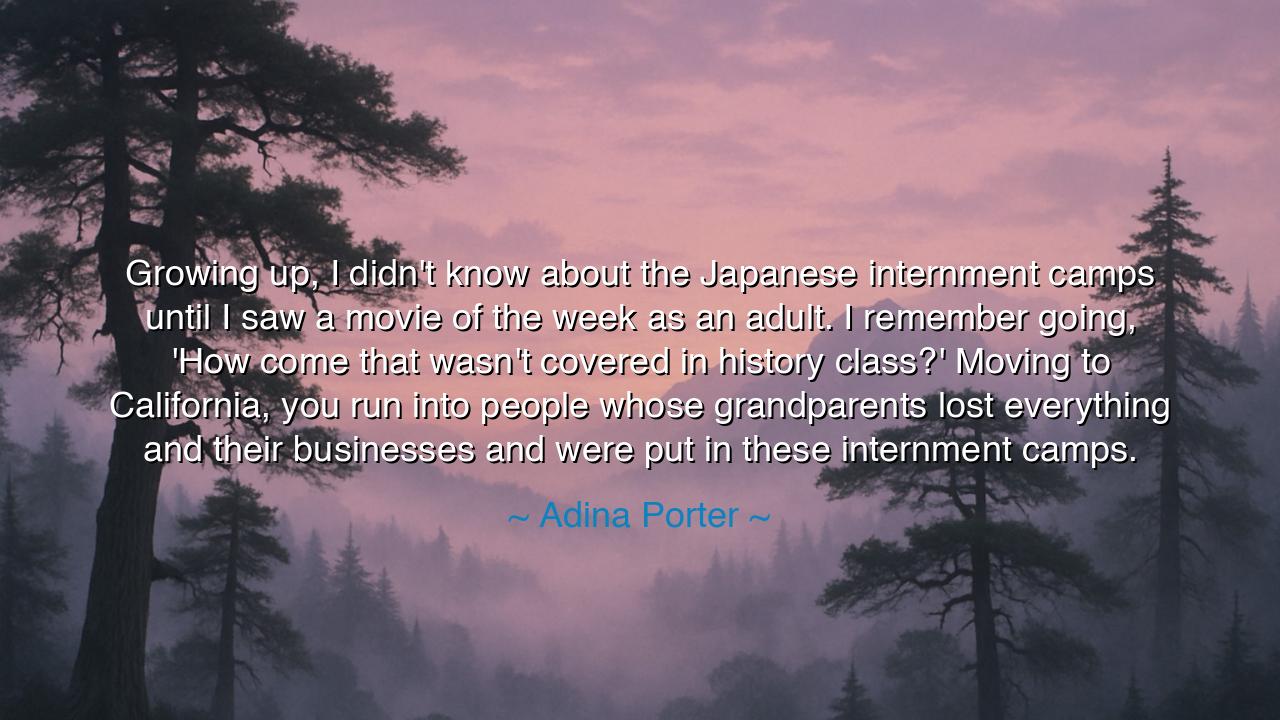
Growing up, I didn't know about the Japanese internment camps
Growing up, I didn't know about the Japanese internment camps until I saw a movie of the week as an adult. I remember going, 'How come that wasn't covered in history class?' Moving to California, you run into people whose grandparents lost everything and their businesses and were put in these internment camps.






The words of Adina Porter — “Growing up, I didn’t know about the Japanese internment camps until I saw a movie of the week as an adult. I remember going, ‘How come that wasn’t covered in history class?’ Moving to California, you run into people whose grandparents lost everything and their businesses and were put in these internment camps.” — are not only an observation, but a lamentation. They speak to the tragedy of forgotten history, of the silence that often follows injustice. In her astonishment and sorrow, Porter becomes a voice for all who awaken too late to the buried pain of others. Her words remind us that the greatest danger to truth is not lies, but omission — the quiet removal of suffering from the collective memory of a people. For what is not remembered cannot be mourned, and what is not mourned cannot be healed.
The Japanese internment camps of World War II stand as one of the darkest stains upon the conscience of America. After the attack on Pearl Harbor in 1941, fear and prejudice swept the nation, and over 120,000 Japanese Americans, most of them citizens, were forcibly removed from their homes, their businesses, their schools. Entire families were herded into desolate camps in the mountains and deserts, surrounded by barbed wire, watched by armed guards — not for any crime they had committed, but for the heritage they carried. Their loyalty was doubted, their freedom stripped away, their dignity tested. Yet when peace returned, many found that their story had been erased from textbooks, as though their suffering were an embarrassment to be hidden rather than a lesson to be learned.
Porter’s discovery, made not through school but through a television film, reveals how deeply this erasure ran. It is a wound within education itself — that the very institutions meant to illuminate truth sometimes shelter it from view. The shock she describes — that moment of realizing a nation’s failure to teach its own sins — is the beginning of awakening, the point at which innocence gives way to awareness. For in every age, there comes a time when one must ask, “What have I not been told?” It is a question both painful and holy, for it is the question that begins all true understanding.
In ancient times, the philosophers taught that to know only triumph and virtue is to know only half of humanity. The wise among them believed that memory is justice, and that a civilization which forgets its shame will surely repeat it. Consider the story of Socrates, who, condemned for speaking uncomfortable truths, said before his death, “The unexamined life is not worth living.” Porter's realization is an echo of this same wisdom — that a nation which does not examine its past lives in illusion, and that its people walk as shadows, knowing not who they are or what they have become. The duty of remembrance is not merely historical; it is moral.
The internment of Japanese Americans was not just a matter of policy, but a revelation of the frailty of democracy when fear takes the throne. The ancestors of those imprisoned bore the quiet burden of endurance, rebuilding their lives with grace where bitterness might have taken root. And yet, as Porter observed, their pain was passed down in whispers rather than stories. It is only when new generations encounter the truth — often by accident — that the veil begins to lift. The grandchildren of the interned, living reminders of that injustice, stand as proof that the past, no matter how buried, still breathes through the lives it has shaped.
From her words we draw a timeless lesson: education without honesty is blindness. To study history is not merely to memorize dates and victories, but to confront the mistakes that define our moral inheritance. The light of truth cannot be confined to moments of pride; it must also shine upon our failures. Every generation must reclaim what has been silenced — to listen to the stories of the marginalized, to restore them to the chorus of humanity. In doing so, we not only honor the dead, but strengthen the living, for truth is the only foundation upon which justice can stand.
So, my child, let this teaching sink into your heart: seek what has been hidden. When you hear silence where there should be memory, dig deeper. When your books grow quiet about suffering, question them. For truth, though buried, never dies — it waits for the courageous to unearth it. Be among those who remember, who speak the names that were forgotten, who teach the histories that were erased. For the measure of a people is not in how they celebrate their triumphs, but in how they confront their wrongs — and only through remembrance can a nation, or a soul, ever hope to be whole again.






AAdministratorAdministrator
Welcome, honored guests. Please leave a comment, we will respond soon